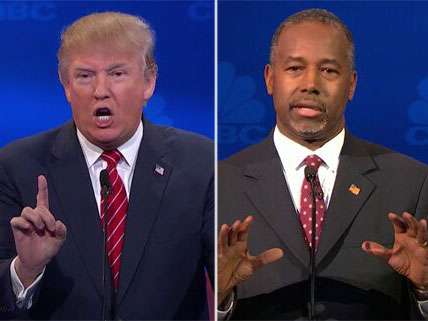The Republican Primary Debates as Casting Calls for the President Show

One way to think the presidential debate are as political improv events, where the goal is not to be funny but to perform in a way that comes across as presidential. The candidates on the stage are essentially posing as actors, being asked to prepare and write their own lines in front of us. They're casting calls for the President Show. That's the strength of the debates. It's also their weakness.
Candidates can study up on the news and public policy, and have the option to make clear explanations of policy proposals part of their performance, but doing so is not always entirely necessary, as the dual successes of Donald Trump and Ben Carson show. Both men have often appeared unaware of basic policy facts, and neither has been especially clear on their own ideas for governance. Nearly all of Trump's policy ideas can be reduced to the phrase, "I'll figure it out later," and Carson's are frequently even more confused.
This hasn't seemed to matter much, at least not so far, because each of them in their own way has offered a performance of presidential demeanor that GOP voters have found compelling: Trump, the tough, swaggering businessman; Carson, the soft-spoken surgical innovator. Both men have, in a sense, created successful characters, and when likely GOP voters respond with support, what those voters are essentially saying is that they would cast those characters in the eventual role of president.
Primary voters, however, often think not only about which character they could see in the role of president, but about which character others would be willing to accept in the role as well. In 2012, for example, GOP voters had many problems with Mitt Romney, but generally believed he was the most electable, and he eventually became the nominee. Regardless of one's other feelings about Romney, he certainly looked the part.
That's where candidates like Trump and Carson tend to struggle. Eventually, primary voters usually make some effort to try to imagine not only the President Show they would like to see, but the one that could attract enough national support to make it into production as well.
That's why Marco Rubio now looks like the candidate with the best chance of eventually winning the nomination. Even though he trails Carson and Trump in the polls, he's improved his standing recently, and he's far and away the favorite to win amongst those with money on the line, with a 39 percent chance of winning, compared to Trump's 15 percent.
As with both Trump and Carson, much of his success owes to the character he has created: youthful and energetic but not overeager, optimistic and earnest yet hardly un-self-aware. That's the candidate who showed up at last night's debate, and why he continues to improve his standing.
But Rubio is a more substantive candidate than either Trump or Carson (one could hardly be less), and as his eventual nomination looks more and more plausible, it's worth looking beyond his character to his ideas about governance. Because the search for a person to play the lead character on the President Show is also in some sense a search for a lead writer, an executive producer who will hire all the department heads and oversee the production.
The debates provide a fine format for revealing the essential elements of the character that each candidate is playing, but even when they are relatively substantive, as in last night's contest, they are less suited to revealing how the candidate would perform in that other role.
Debates are televised events built around short, dramatic exchanges. The incentive is to perform the presidential character rather than to demonstrate administrative competency or executive vision.
Yet that other role is the one that, while less visible to the public, is by most measures the most important to the job, and to the functioning of the country. So it is worth remembering, as these debates continue, that whoever is eventually cast as president won't just be playing the part, he or she will be deciding on the storylines as well.
